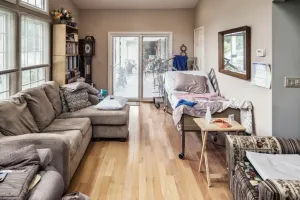Originally published on October 18, 2022 by MedCityNews
Allina Health, a 12-hospital health system based in Minneapolis, has teamed up with Flare Capital Partners to spin out a new company named Inbound Health. The startup, which emerged from stealth mode on Tuesday, is designed to help enable health systems and health plans to establish hospital-at-home and skilled nursing-at-home programs.
The startup’s at-home care platform includes AI-powered analytics to determine which patients would benefit from at-home care, 24/7 vitals monitoring, video visit technology and a communication portal to help patients connect with clinicians.
The platform has been in use at Allina Health since 2020, according to CEO David Kerwar, who left his role as Mount Sinai’s chief product officer and head of consumer digital innovations in June. More than 4,200 Allina Health patients being treated for 185 different diagnoses have received care through Inbound’s platform, he said in an interview.
Inbound partners with health systems to scale their at-home care models, allowing the latter to utilize existing capabilities and tap the startup to fill in gaps. Inbound can provide health systems with the virtual care teams, technology, analytics, payment models and supply chain partnerships they need to operate successful at-home care programs, according to Kerwar.
“A lot of times, health systems have different strategic priorities when it comes to hospital-at-home or skilled nursing-at-home,” he said. “Our clinical leaders can help to customize the care pathway to the health system’s unique needs.”
But Inbound isn’t the only company that helps health systems roll out at-home care programs.
There’s Medically Home, a company that has helped Kaiser Permanente and Mayo Clinic grow their at-home care models. Another competitor is Contessa Health, which was acquired by home health chain Amedisys last year. Meanwhile Inbound aims to set itself apart from the competition with its full-scale capabilities, according to Kerwar.
“We provide all the capabilities — we’re not just a technology company and we’re not just a group of virtual physicians,” he said. “We provide the technology, the command center, the hospitalists and virtual physicians. We also bring supply chain to the partnership, and we bring value partners that we source and pay ourselves to fill the gaps if a program, for instance, needs home infusion or durable medical equipment.”
Inbound has also been able to establish a payment model and sign contracts with Minnesota health plans, Kerwar said, though he declined to name the plans.
“We help health systems create a financially sustainable program by helping them establish a common contract with payers,” he said. “We work with them to create enough data before they get on contract to show that a program can save 30-40% of costs versus traditional facility care, while having good — if not better — clinical outcomes.”
In addition to spinning out the company, Allina Health and Flare Capital Partners led a $20 million fundraising round for Inbound. The company will use the money to expand to “probably three to four additional markets” beyond Minnesota next year, Kerwar said.

